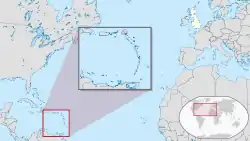Anguilla
Anguilla is a group of five islands in the Caribbean Sea. The islands are ruled by the United Kingdom.
Anguilla | |
|---|---|
 Coat of arms
| |
| Motto: "Unity, Strength and Endurance" | |
Anthem:
| |
 Location of Anguilla (circled in red) | |
_-_AIA_-_UNOCHA.svg.png.webp) | |
| Status | British Overseas Territory |
| Capital and largest city | The Valley |
| Official languages | English |
| Ethnic groups ([1]) |
|
| Religion | 90.3 % Christian 9.7 % Others |
| Demonym(s) | Anguillian |
| Government | Parliamentary dependency under a constitutional monarchy |
• Monarch | Charles III |
• Governor | Tim Foy |
• Deputy Governor | Perin A. Bradley |
| Victor Banks | |
• Responsible Ministerb (UK) | Alan Duncan MP |
| Legislature | House of Assembly |
| Establishment | |
• Overseas territory | 1980 |
| Area | |
• Total | 91 km2 (35 sq mi) (unranked) |
• Water (%) | negligible |
| Population | |
• 2021 estimate | 15,753[2][3] |
• 2011 census | 13,452 |
• Density | 132/km2 (341.9/sq mi) (n/a) |
| GDP (PPP) | 2014 estimate |
• Total | $311 million[4] |
• Per capita | $29,493.3 |
| Currency | East Caribbean dollar (XCD) |
| Time zone | UTC-4 |
| Driving side | left |
| Calling code | +1-264 |
| ISO 3166 code | AI |
| Internet TLD | .ai |
| |
Anguilla was colonized by the British Empire and used to be part of what is now Saint Kitts and Nevis, but broke away in 1980 so it could stay part of Great Britain. Saint Kitts and Nevis wanted to be independent.
It is named after the Spanish word for "eel", because it has such a shape.
Anguilla was first settled by Arawakan-speaking Indians who called it Malliouhana.
Politics
The King or Queen of the United Kingdom is the ruler of Anguilla, but she works through a governor. He or she names, or appoints the governor, and he is just working there in place of the monarch. The legislature is elected by the people, has 11 members, and is called the House of Assembly.
Economy
Anguilla has mostly been part of the British Empire since the 17th century. The British brought thousands of slaves from Africa and forced them to work, like they did all over the Caribbean and North America. Many of the slaves decided to run away rather than be forced to work.[5] When the British decided to abolish slavery they paid all the slave owners a lot of money,[6] but didn't give anything to the slaves. Now Anguilla gets most of its money from fishing and tourism.
Culture
Most people in Anguilla are Protestants, and speak English.
References
- "Central America :: Anguilla — The World Factbook - Central Intelligence Agency". The World Factbook. Archived from the original on 2020-04-07. Retrieved 2012-05-03.
- "World Population Prospects 2022". population.un.org. United Nations Department of Economic and Social Affairs, Population Division. Retrieved July 17, 2022.
- "World Population Prospects 2022: Demographic indicators by region, subregion and country, annually for 1950-2100" (XSLX). population.un.org ("Total Population, as of 1 July (thousands)"). United Nations Department of Economic and Social Affairs, Population Division. Retrieved July 17, 2022.
- "UN Data". Retrieved 7 January 2017.
- Gaspar, David Barry (1993). Bondmen and rebels : a study of master-slave relations in Antigua. Internet Archive. Durham : Duke University Press. ISBN 978-0-8223-1336-6.
- House of Commons (1838-03-16). Accounts of slave compensation claims; for the colonies of Jamaica. Antigua. Honduras. St. Christopher's. Grenada. Dominica. Nevis. Virgin Islands. St. Lucia. British Guiana. Montserrat. Bermuda. Bahamas. Tobago. St. Vincent's. Trinidad. Barbadoes. Mauritius. Cape of Good Hope. pp. 93–94, 312.
